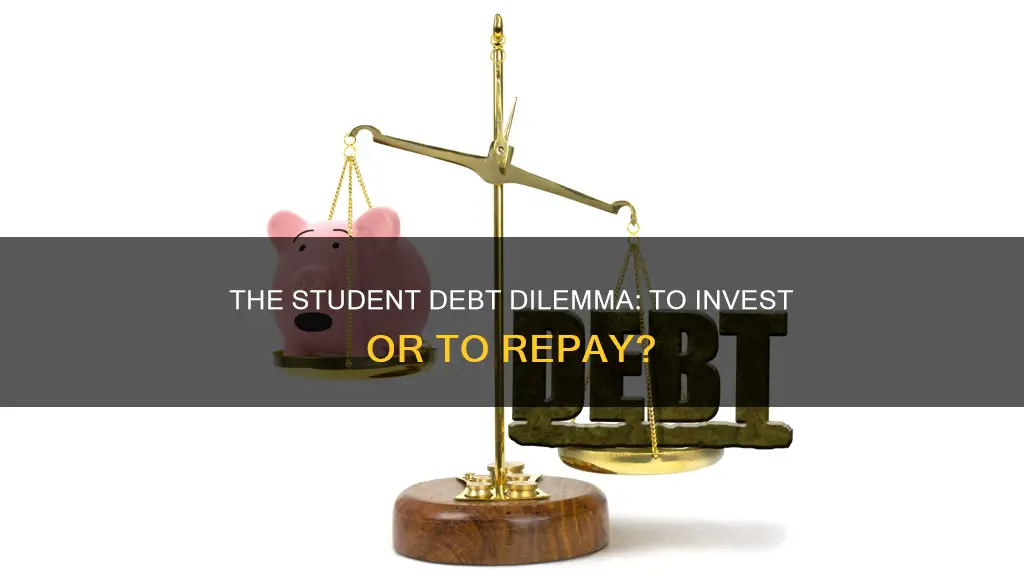
Whether you should invest or pay off student debt depends on your financial situation and goals. If you want to become debt-free quickly, putting your extra money towards removing student debt is ideal. However, investing could be a better option if your expected rate of return is higher than your student loan's interest rate or if you want to work on your financial security.
If you have high-interest student loans, it is generally recommended to pay those off first. However, if you are in a loan forgiveness program or have a low-interest rate, investing may be a better option. Ultimately, it is important to consider your overall financial health, including your other debts, savings goals, and personal priorities when deciding whether to invest or pay off student debt.
| Characteristics | Values |
|---|---|
| Interest rate | If the interest rate on your student loan is greater than the rate of return you can reasonably expect from investing, then paying off the loan as quickly as possible will save you money. |
| Rate of return | If you can make a better rate of return on your investment than the interest rate you’re paying on your student loan, then it may make sense to pay the minimum amount on your student loans and invest the rest. |
| Emergency fund | Make sure you have an emergency fund before deciding whether to pay off student loans or invest. |
| Retirement | If you've hit your retirement savings goals or are well on your way, you can decide whether to use any leftover money to pay off student loans or invest. |
| Debt-free | If paying off student loans early is a major personal goal and doing so would relieve a burden and bring more joy than having a hefty investment account, go for it. |
| Loan forgiveness | If you plan to take advantage of student loan forgiveness, then it doesn’t make sense to put extra payments toward the debt. |
What You'll Learn

Weigh up the interest rate on your student loan against the rate of return on your investments
When deciding whether to invest or pay off student debt, it's important to weigh up the interest rate on your student loan against the rate of return on your investments.
Student loan interest rates
Student loan interest rates vary depending on the type of loan and the lender. Federal student loans currently have interest rates ranging from 6.53% to 9.08%, while private student loan interest rates can range from around 4% to 17%. Federal student loan rates are fixed, meaning they won't fluctuate over the life of the loan. On the other hand, private student loans can have either fixed or variable rates.
Investment returns
When it comes to investments, a conservative but plausible return is considered to be around 6% per year. Stocks can generally offer a long-term rate of return of over 9% per year, but returns can be volatile in the short term.
Weighing up the interest rate and investment returns
When deciding whether to invest or pay off student debt, it's important to compare the interest rate on your student loan to the expected rate of return on your investments. If your student loan interest rate is higher than the expected rate of return on your investments, then focusing on getting out of debt faster may be the better option. On the other hand, if your expected rate of return on investments is higher than your student loan interest rate, then investing may be the better choice.
For example, if you have a student loan with an interest rate of 8% and you're considering investing in stocks with an expected long-term rate of return of 9%, investing may be the better option as the expected return is higher than the interest rate. On the other hand, if you have a student loan with an interest rate of 10% and you're considering the same investment, paying off the student loan may be the better option as the interest rate is higher than the expected return.
It's also important to consider your financial goals and priorities when making this decision. If becoming debt-free is a top priority for you, then you may want to focus on paying off your student loans even if the interest rate is lower than the expected investment returns. Investing may be a better option if you're more focused on building financial security. Additionally, if you're enrolled in a student loan forgiveness plan, investing may make more sense than paying off your loans early.
Student Loans vs. Investing: Navigating the Trade-offs
You may want to see also

Consider the tax deductions for student loan interest
When deciding whether to invest or pay off student debt, it is important to consider the tax deductions for student loan interest.
The student loan interest deduction is a federal income tax deduction that allows borrowers to subtract up to $2,500 of the interest paid on qualified student loans from their taxable income. This deduction is available to individuals with a modified adjusted gross income (MAGI) of less than a specified amount, which is set annually. For the 2023 tax year, the deduction is phased out for single taxpayers with a MAGI between $75,000 and $90,000, and for those filing jointly with a MAGI between $155,000 and $185,000. The deduction is not available for those with a MAGI above these maximum amounts.
To be eligible for the deduction, the loan must meet certain qualifications. It must be taken out for the taxpayer, the taxpayer's spouse, or dependent(s), and the taxpayer must be legally obligated to pay the interest. The loan must also be used for qualified higher education expenses, such as tuition, fees, textbooks, and supplies, and the school must be an eligible institution that participates in federal student aid programs.
The student loan interest deduction can provide a significant tax benefit, especially for those in higher tax brackets. For example, if you are in the 22% tax bracket and claim the full $2,500 deduction, you would save $550 in taxes. This deduction can help reduce the overall cost of borrowing for education and can be claimed without having to itemize deductions.
In addition to the student loan interest deduction, there are other tax breaks available to students and their parents, such as the American Opportunity Tax Credit and the Lifetime Learning Credit, which offer additional savings on education expenses.
When deciding whether to invest or pay off student debt, it is important to consider the potential tax benefits of the student loan interest deduction. This deduction can help reduce the cost of borrowing and may be a factor in determining the best use of your financial resources.
Inheritance Dilemma: Invest or Pay Off Mortgage?
You may want to see also

Think about the psychological burden of carrying student loan debt
The burden of student loan debt can have a significant impact on an individual's mental health and overall quality of life. The sheer magnitude of debt can evoke feelings of anxiety, helplessness, and despair, with the knowledge that a large portion of their income will be allocated to loan payments for years to come. This can lead to increased stress levels and a sense of financial instability.
The constant worry about debt repayment, combined with academic and professional pressures, can take a toll on one's mental well-being. The fear of defaulting on loans or facing financial hardship can result in chronic stress, sleep disturbances, and even suicidal ideation in severe cases. "Debt shame" is a phenomenon where individuals feel embarrassed or ashamed of their financial situation, leading to low self-esteem and a sense of inadequacy.
Additionally, the stress of student loan debt can lead to financial denial, where individuals avoid dealing with their financial situation by not sticking to a budget, ignoring bank statements, and neglecting their money management responsibilities. This can result in further financial troubles and emotional distress.
The impact of student loan debt varies across demographics. Black borrowers, for instance, are more likely to experience long-term stress related to their student debt while achieving fewer rewards. They tend to owe more than their original loan amount even years after graduation, holding significantly more debt than their white counterparts.
The burden of student loan debt can also lead to sacrifices and difficult choices. Many individuals make monthly payments but must stay in unsatisfactory jobs or delay major life decisions such as homeownership or starting a family. For those who default on their loans, there are dire financial consequences, including wage garnishment, withholding of tax returns and benefits, and negative impacts on credit scores, making it challenging to secure housing or certain jobs.
To cope with the psychological burden of student loan debt, individuals can seek social support from friends, family, or support groups. Practicing self-care activities such as exercise, mindfulness, and hobbies can also help alleviate stress and improve overall well-being. Additionally, improving financial literacy and money management skills can empower individuals to regain a sense of control over their finances and reduce anxiety and uncertainty.
Investment Scams: Why the Fall?
You may want to see also

Assess your financial priorities and goals
Before deciding whether to pay off student loans or invest, it is important to assess your financial priorities and goals. This involves evaluating your current financial situation, including your monthly cash flow, discretionary income, and emergency fund. Here are some key considerations to help you make an informed decision:
- Monthly cash flow and discretionary income: Do you have money left over after covering your essential expenses, or are you living paycheck to paycheck? This will impact your ability to invest or make extra payments towards your student loans.
- Emergency fund: It is generally recommended to have at least three months' worth of expenses saved up for unexpected costs. Building an emergency fund should be a priority before deciding between paying off student loans or investing.
- Retirement savings: If you haven't already, consider starting to save for retirement, either through a 401(k) plan, an individual retirement account (IRA), or other investment vehicles. This will help ensure you are on track for a comfortable retirement.
- High-interest debt: Focus on paying off any high-interest debt, such as credit card balances or personal loans, as these typically have higher interest rates than student loans.
- Financial goals: Are you planning to buy a house, start a family, or save for a down payment? These big life goals may influence your decision to invest or pay off student loans.
- Psychological burden of debt: Carrying student loan debt can be stressful, and you may want to prioritize paying it off to relieve that burden. However, investing could provide a better return in the long run, especially if you have a low-interest rate on your student loans.
- Tax benefits: Consider the tax benefits of both options. For example, you may be able to deduct up to a certain amount of student loan interest paid per year from your taxable income. On the other hand, contributing to a 401(k) or traditional IRA can also lower your taxable income.
- Loan forgiveness: If you are enrolled in a student loan forgiveness program, such as Public Service Loan Forgiveness, it may not make financial sense to pay off your loans early. Instead, focus on making the minimum payments and invest any extra funds.
Ultimately, the decision to pay off student loans or invest depends on your individual financial situation, goals, and risk tolerance. It may even be possible to do both simultaneously, by investing a portion of your discretionary income while also making extra payments towards your student loans. Consulting with a financial advisor can help you weigh your options and make a decision that aligns with your priorities.
Investor Influx: Impacting Markets
You may want to see also

Consult a financial advisor
Consulting a financial advisor is a great way to get a professional opinion on how to handle your student debt and investments. They can help you understand your financial situation and guide you towards your goals. Here are some things to keep in mind and discuss with your financial advisor:
Your Financial Situation
First, assess your current financial situation. How is your monthly cash flow? Do you have any money left over after covering your essential expenses, or are you living paycheck to paycheck? It's important to be honest with yourself and your advisor about your financial health.
Emergency Funds
Before deciding whether to pay off student loans or invest, ensure you have an emergency fund in place. This will act as a safety net in case of unexpected expenses. Ideally, you should aim to save at least three months' worth of expenses for emergencies.
Interest Rates and Debt Burden
The interest rate on your student loans is a crucial factor in your decision. High-interest rates can cause your debt to grow rapidly, so paying off these loans may be a priority. Private student loans tend to have higher interest rates than federal loans and often offer fewer protections and repayment options. If your student loan interest rates are higher than the potential returns on your investments, you may want to prioritize paying off the loans.
Investment Returns and Retirement Plans
Consider the potential returns on your investments. If you expect a higher rate of return from investing than the interest rate on your student loans, investing may be a better option. However, investing carries the risk of losing money, and returns are not guaranteed. Discuss the potential investment options with your financial advisor, including tax-advantaged retirement accounts like a 401(k) or an IRA.
Loan Forgiveness and Repayment Plans
If you have federal student loans, you may be eligible for loan forgiveness programs or income-driven repayment plans. These can significantly reduce the amount you need to repay. However, refinancing federal loans into private loans may cause you to lose these benefits, so be sure to carefully consider this with your advisor.
Stress and Peace of Mind
Personal finance is not just about numbers; it's also emotional. If your student loans are causing you significant stress or impacting your lifestyle goals, paying them off first may be the best option for your mental health and well-being.
Balancing Both
Remember, you don't necessarily have to choose one over the other. It is possible to balance paying off your student loans and investing simultaneously. Discuss this option with your financial advisor, and they can help you create a plan to achieve both goals.
In conclusion, consulting a financial advisor is a wise step when deciding whether to invest or pay off student debt. They will provide personalized advice based on your unique circumstances and help you make informed decisions about your financial future.
Green Energy's Golden Promise: Worth the Investment?
You may want to see also







